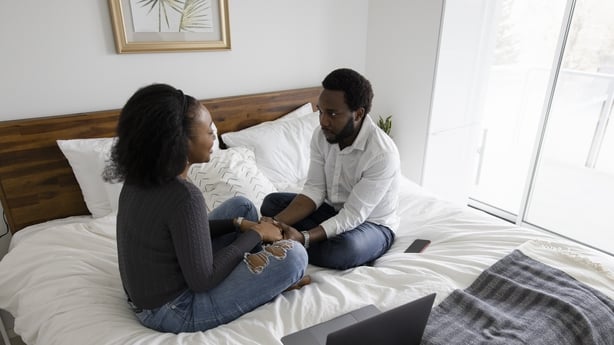Dr. Caroline West is a sex educator and host of the Glow West podcast, which focuses on sex, sexuality and the body. Here, she writes about when your libido doesn't match up to your partner's, and how to address it if you want more sex and intimacy.
One of the most common topics for relationship advisors and sex educators is about a mismatch in libidos. People worry they are not having 'enough' sex, or ‘wild’ enough sex, and want to know how much intimacy is the right amount.
The good news is, the only right amount is what works for you. Comparing ourselves to others means that we lose track of our own authentic sexual selves, and it is more beneficial to focus on ourselves and remove pressure about what we ‘should’ be doing and when.

A common reason for differences in libido is different types of desire responses. We often think of intimacy as feeling aroused at the thought of intimacy – this is known as ‘spontaneous desire’ – but desire can be a response to touch or sexual contact.
One partner might not feel in the mood but will become aroused as a response to activity. This type of desire is known as ‘responsive desire’ and can be a common response among women in particular.
Issues arise when partners have different kinds of desire, and don’t know how to communicate this. This might look like one partner being frustrated at having to be the initiator, while the other person feels guilt at being more passive at the start of sexual contact. The initiator may also feel as if they are putting pressure on their partner. This guilt can be stifling and inhabit conversations that bring these feelings into the open where they can be worked on.
Communication is a magic wand for relationships: talking about this enables a couple to work through the issue in a way that makes sense for them. Perhaps the solution is to try to switch up initiation, or to try new forms of intimacy before sexual contact. There will be no ‘one size fits all’ approach as humans are too complicated for that, but whatever works for the couple must ensure the needs of both parties are met.

Compromise is important to make sure each partner feels listened to and as intimacy is meant to be mutually pleasurable, this means that not only will the initial issue be addressed, but there is a great chance for sexual satisfaction through having the kind of intimacy you want, on your terms. Consent is about so much more than just saying yes – it's about knowing why we want to say yes and understanding what we are saying yes to.
The initiator may feel like they are being forceful if they are always the one to make the first move and the other person does not initially seem in the mood. This can be addressed through communication and understanding how each person experiences desire and looking at ways of asking for intimacy that feel comfortable. There are some inclusive and accessible modern sex education guides that help couples with this.
There is no shame in not knowing how to communicate. This isn't something that we are taught in school, and often parents feel uncomfortable talking about this aspect of intimacy with their teenagers. We all have to start somewhere and discovering this together can build emotional intimacy which in turn benefits the relationship in many ways.
We need your consent to load this Instagram contentWe use Instagram to manage extra content that can set cookies on your device and collect data about your activity. Please review their details and accept them to load the content.Manage Preferences
Taking online workshops can be an accessible way to learn about communication skills, and Irish intimacy specialists such as Grace Alice O’Shea offer affordable one on one sessions for couples to develop their skills.
Menopause can also be a drain on desire, whether it is perimenopause, menopause itself, or post menopause. Fluctuating hormones can impact sex drive and lubrication levels, and difficulty sleeping due to feeling hot can also impact our general energy levels.
There are some modern lubricants on the market that can be used, and indeed, lube is an excellent addition to everyone's sex life while also helping to reduce the risk of condoms breaking. Brands such as Yes Organics, Uberlube, and Hanx offer sustainable products with minimal ingredients that avoid risking upsetting vaginal pH.
Some medications, particularly SSRIs for mental health, can hinder sexual desire or ability to orgasm. If this applies to you and causes you unhappiness, you can chat with your GP about options. Sexual wellness impacts our mental wellness, and vice versa. When we are not feeling our best mentally or physically, desire can take a dip and energy levels to address it might be low.

Talking this through with partners helps to ease any sense of feeling guilty for not being sexual ‘enough’. It can be difficult to experience life with depression or anxiety, therefore, self-compassion through understanding how this can impact our sexual lives is essential. We are only human, and no one is sexually aroused 24/7, so being realistic about what works for us helps us to maintain the connection with our partners.
It is natural for the libido to ebb and flow throughout the different stages of life, but if you find yourself ‘stuck’ in a phase for long periods of time, a trip to your GP can help rule out any underlying medical conditions. It is easy for sex to take a back seat in long term relationships as life gets stressful with children, work, and financial stresses, but making it a priority – even if it needs to be scheduled – can help make the relationships sustainable through emotional intimacy.
There are wonderful technological advancements in the world of sex toys for all genders and exploring these can help reignite that spark. Couples can try apps where one person can control the vibrator or enjoy different settings on a toy that you can both use. Creativity is the antithesis to boredom in relationships, and sex is a space to have fun playing with our bodies and to enjoy pleasure.
This may feel like an insurmountable challenge, especially if emotions are running high, but with compassion, communication and mutual willingness, relationships can become stronger as couples reconnect with themselves and each other.
The views expressed here are those of the author and do not represent or reflect the views of RTÉ.

